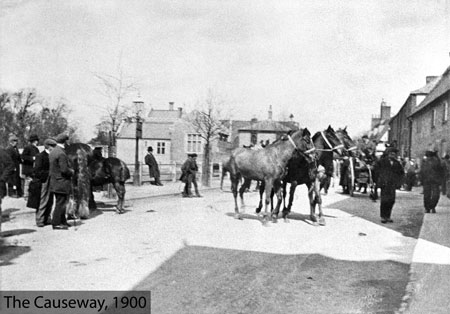Many years ago a livestock fair was held every Easter Tuesday in the town. Chartered by James I in 1605, the fair was the largest in the Eastern Counties. On the following day was held the 'Court of Piepowder, the name probably deriving from the French Pied Poudre, meaning vagabond". The fair attracted thieves and vagabonds from all over the country who caused sufficient trouble for a court to be held the following day before they left town.
the largest in the Eastern Counties. On the following day was held the 'Court of Piepowder, the name probably deriving from the French Pied Poudre, meaning vagabond". The fair attracted thieves and vagabonds from all over the country who caused sufficient trouble for a court to be held the following day before they left town.
Post Street was supposedly named for the wooden posts sunk at short intervals on either side of the road to which were tethered up to a hundred horses for sale on the day of the fair. Cattle and sheep occupied Old Court Hall, Silver Street and Cambridge Road, as well as the small side streets. Many residents complained about being penned in their homes as sheep were tethered up to their front doors but on the whole the fair was looked forward to from one year to the next.
One can imagine the scene. Village people arriving by foot and by the wagon load, dressed in their Sunday best, the ladies showing off their beribboned Sunday bonnets. Life was very hard for most people and an event such as this was a welcome break from their day to day drudgery. The young men probably flirted with the Portholme Milch Maids, whose beauty was so admired by the diarist Samuel Pepys on his visits to Brampton, while the girls met the men of the town away from the confines of their small villages. No doubt Portholme saw its share of courting couples. Drovers and stockmen filled the many local taverns mingling with farmers, butchers and tradesmen doing deals among scenes of drunken debauchery. Merchants came from far and wide to trade their wares together with organ grinders, jugglers and dancing bears. Stalls selling whelks and eels, mutton pies and bakery goods did a roaring trade.
For the more sober minded citizens, including a Quaker community this must have been a time to dread. The taverns and inns stayed open all night and many inebriates fell victim to unscrupulous women and pickpockets. Fights were common and Pie Powder Court had quite a few miscreants to deal with. Unfortunately some of the local residents were as dishonest as the out of town traders, withholding payment knowing that these nomadic merchants had to move on.
Accommodation and stabling were stretched to the limits in both Huntingdon and Godmanchester enabling local residents to make pin money by supplying bed and board when all the hostelries were full.
In the 1860's an epidemic of Rindepest destroyed cattle throughout the county and this started the fair's decline. By the beginning of this century it was no more than a horse sale held in Cambridge Street. By the end of the First World War the fair had ceased altogether ending a colourful chapter in Godmanchester's history.
Editor's note: Let's hope that with the growing popularity of Gala Week we are starting a new one!